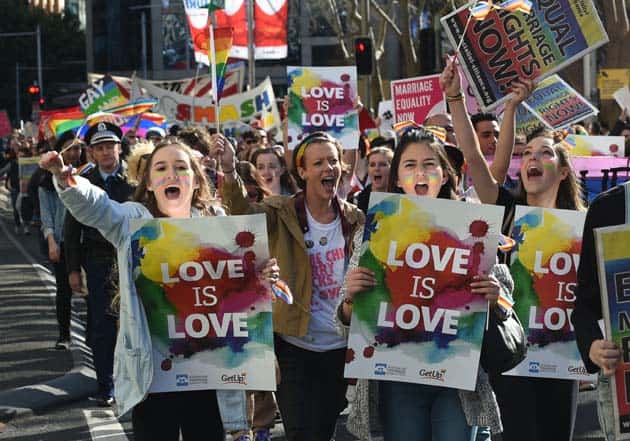In the aftermath of the Bronwyn Bishop travel rorts affair, Abbott has slumped in the polls. Labor is leading 54-46 according to Newspoll. Abbott is as discredited and isolated as he was six months ago when he was challenged for the leadership. Nobody can believe it took him so long to dump Bishop.
Now, unable to shift a millimetre from his white-picket-fence conservatism, Abbott has shot himself in both feet over the same-sex marriage issue. It is hard to see how he can recover from here.
The LNP is left bitterly divided over same-sex marriage. And Abbott has guaranteed that the issue will dog him to the election. If Abbott stays, the next election itself will be a plebiscite on the question. For Abbott and the conservatives, it is a recipe for disaster. The ghost of Ireland is waiting in the wings, carrying a very big stick.
Abbott’s economic conservatism is also centre-stage again as he prepares new attempts to attack unions and drive down workers’ wages.
Abbott took no time at all to follow Liberal NSW Premier Mike Baird’s call to increase the GST to 15 per cent, and declare that an increase in the GST was “on the table”, urging state premiers to “keep an open mind”.
The government’s Productivity Commission draft report into industrial relations was delivered in early August. Given the public outcry about WorkChoices, and the backlash against Abbott’s efforts to cut Medicare, pensions and universities, the Commission tried to argue for modest changes that could be sold to the public.
So it noted that, “There are ethical and community norms about the way in which a country treats its employees.”
But the direction it charts is clear enough. Penalty rates are again under attack, with Sunday rates to be reduced to the Saturday rate, but specifically targeting hospitality, entertainment and retail workers. This could cut Sunday penalty rates by up to 75 per cent.
It also proposes “enterprise contracts”, a form of individual contract that could be presented on a take it or leave it basis, without any need to negotiate with employees or unions.
Unfair dismissal laws would be watered down, and minimum wage increases lower.
Employment Minister Eric Abetz was quick to rule out implementing any of this immediately, but said the government is considering changes to take to the next election.
The ACTU has seized on the plans, calling on people to “door knock to knock off Abbott” at the next election.
Time to fight
Abbott’s crisis should be an invitation for the union leaders to go on the offensive. Abbott has rarely been weaker. But it is no good simply waiting for the next election.
The Labor National Conference showed how weak an alternative a Labor government would be. On all the key controversies, Shorten took a right-wing path, whether delaying a binding vote on same-sex marriage or refugee boat turn-backs.
Workers at Hutchison Ports in Sydney and Brisbane are showing how to fight, after the sacking of 97 workers. In Sydney, those still employed by the company have refused to go back to work, joining protests outside the terminal.
They are fighting back against a multi-billion dollar multinational company, the biggest port operator in the world. Hutchison’s actions make it clear who the real threat to jobs is—profiteering bosses and their mates in the Liberal Party, not Muslims or Chinese workers.
The dispute has shown how badly the law is stacked against workers, with the Hutchison workers who were still employed forced to defy the law and refuse to turn up for work, just to force the company to talk to them.
Similarly, Woolworths warehouse workers at Laverton in Melbourne have been forced to take unlawful strike action to stop management flouting their enterprise agreement to hire casual staff through a labour hire company.
Labor says it supports the workers but will not reinstate the right to strike, or reverse any of the anti-union laws John Howard introduced.
Labor will say nothing to oppose Abbott on refugees or his scaremongering and scapegoating of the Muslim community.
The fightback against Abbott—against his racism, and his anti-union laws—needs to start now. It’s up to us to build a stronger fightback for change.
In the last week, thousands have rallied for equal marriage rights; hundreds more medical workers have taken a stand against the Border Force Act; workers at Hutchison and Woolworths in Victoria are on strike for jobs and against casualisation, and in defiance of the law.
That’s what the fight against Abbott needs to look like. If we link the struggles together and stand united, we can win.






